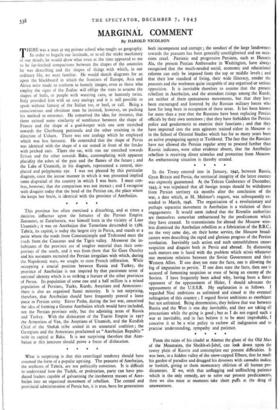What is surprising is that this centrifugal tendency should have
assumed the form of a popular uprising. The peasants of Azerbaijan, the artificers of Tabriz, are not politically conscious. It is difficult to understand how the Tudeh, or proletarian, party can have pro- duced leaders capable of galvanising the incoherent masses of Azer- baijan into an organised movement of rebellion. The central and provincial administration of Persia has, it is true, been for generations both incompetent and corrupt ; the conduct of the large landowners towards the peasants has been generally unenlightened and on occa- sions cruel. Patriotic and progressive Persians, such as Hussein Ala, the present Persian Ambassador in Washington, have always recognised that the much-needed social, economic and educational reforms can only be imposed from the top or middle levels ; and that their low standard of living, their wide illiteracy, render the peasants and the workmen quite incapable of any organised or serious opposition. It is inevitable therefore to assume that the present rebellion in Azerbaijan, and the attendant risings among the Kurds, are neither of them spontaneous movements, but that they have been encouraged and fostered by the Russian military forces who have for long been in occupation of these areas. It has been known for more than a year that the Russians have been replacing Persian officials by their own nominees ; that they have forbidden the Persian police and gendarmerie to exercise their functions ; and that they have imported into the area agitators trained either in Moscow or in the School of Oriental Studies which has for so many years been an active propagating agency at Tashkend. The fact that the Russians have not allowed the Persian regular army to proceed further than Kasvin indicates, were other evidence absent, that the Azerbaijan rebellion is receiving direct stimulus and protection from Moscow. An embarrassing situation is thereby created.
* *






























 Previous page
Previous page